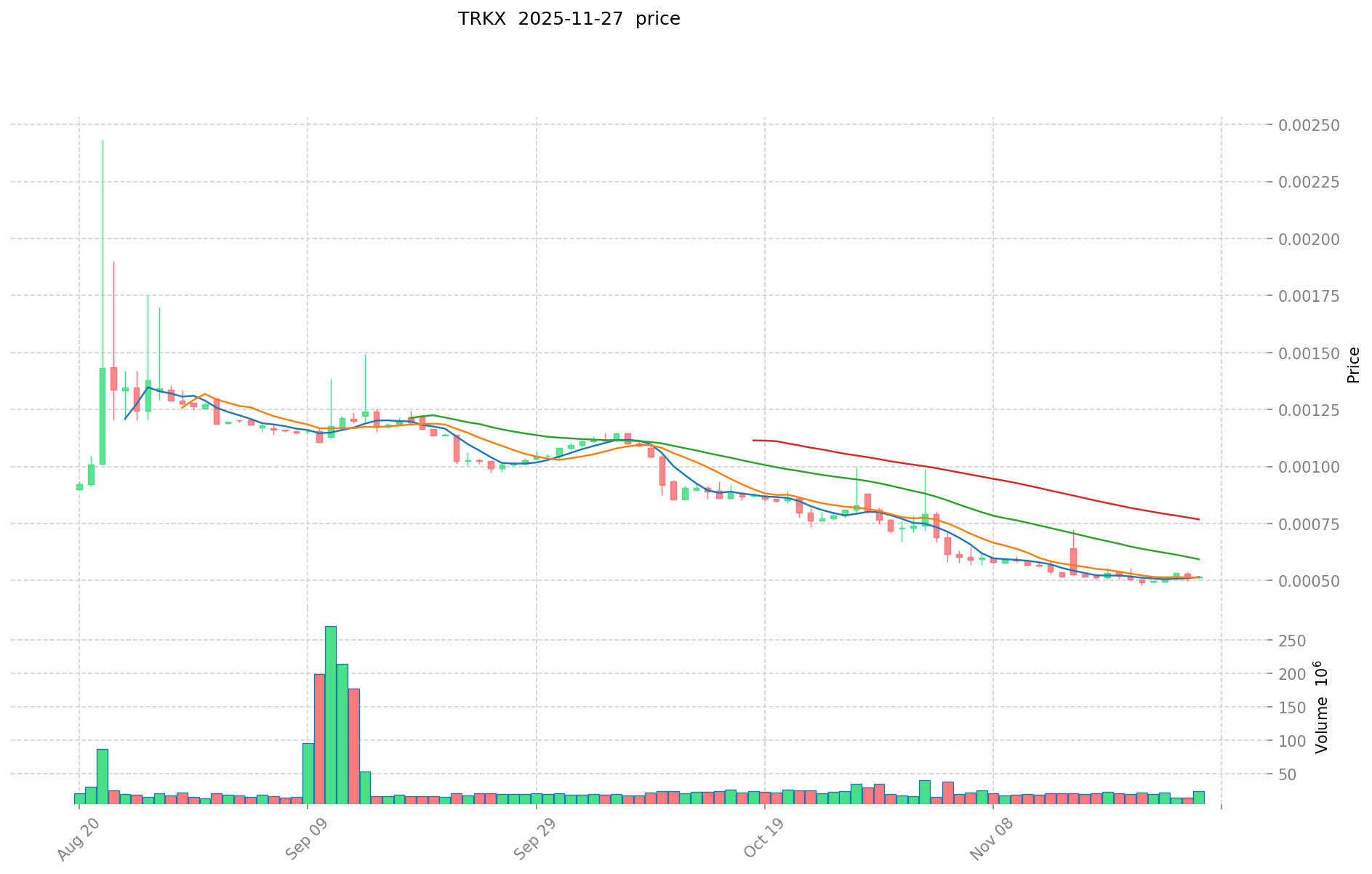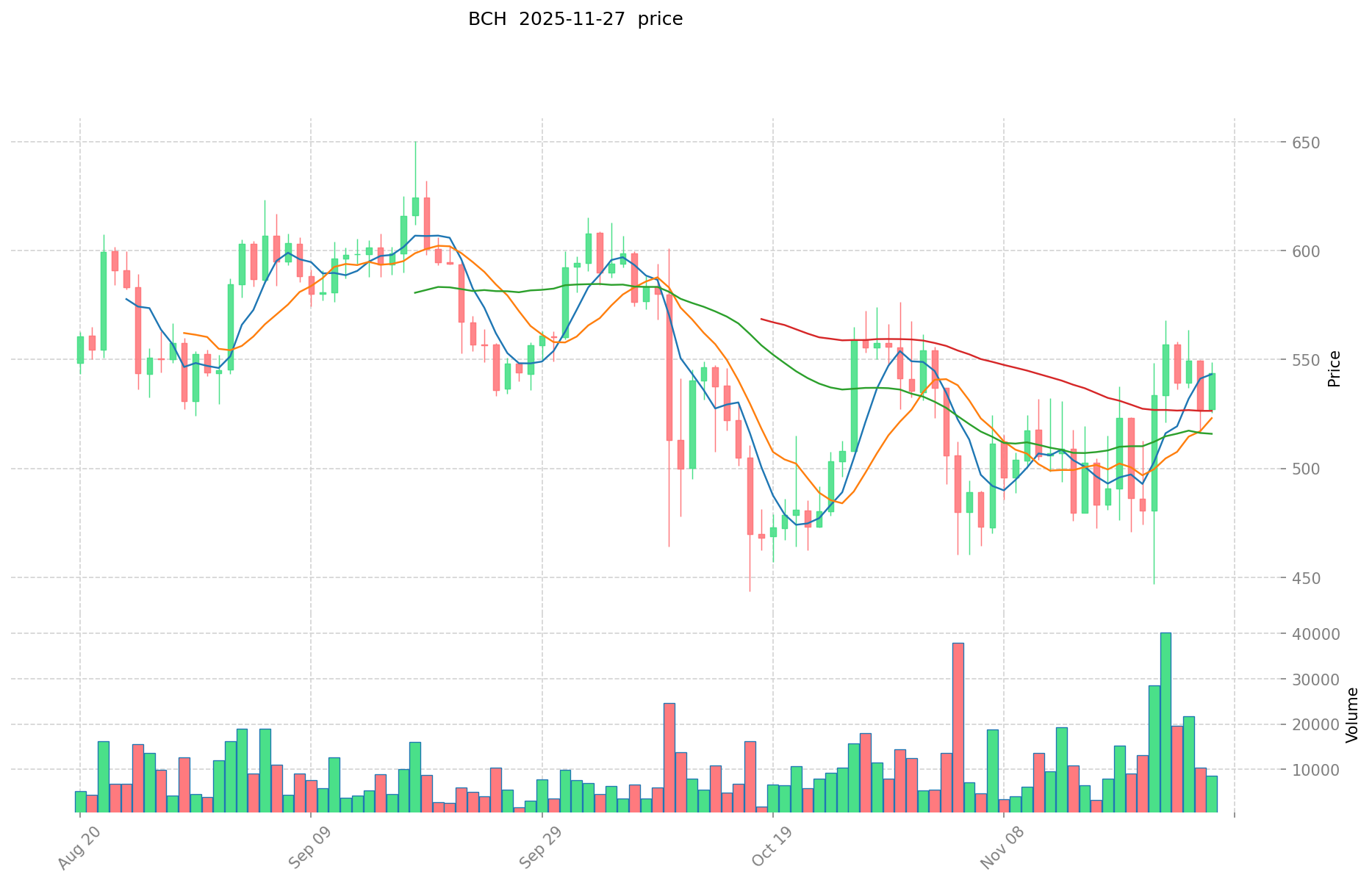TRKX vs BCH: Comparing Two Cryptocurrency Giants in the Digital Asset Market
Introduction: TRKX vs BCH Investment Comparison
In the cryptocurrency market, the comparison between Trakx (TRKX) vs Bitcoin Cash (BCH) has always been a topic that investors can't ignore. The two not only have significant differences in market cap ranking, application scenarios, and price performance, but also represent different positioning in crypto assets.
Trakx (TRKX): Since its launch, it has gained market recognition for its regulated platform for crypto-index trading.
Bitcoin Cash (BCH): Launched in 2017, it has been hailed as a continuation of Satoshi's vision for global adoption, and is one of the cryptocurrencies with the highest global trading volume and market capitalization.
This article will comprehensively analyze the investment value comparison between TRKX vs BCH, focusing on historical price trends, supply mechanisms, institutional adoption, technological ecosystems, and future predictions, attempting to answer the question that investors care most about:
"Which is the better buy right now?"
I. Price History Comparison and Current Market Status
TRKX (Coin A) and BCH (Coin B) Historical Price Trends
- 2024: TRKX reached its all-time high of $0.08408 on October 15, 2024.
- 2017: BCH was created through a hard fork from Bitcoin, with an initial price of $555.89 on July 23, 2017.
- Comparative analysis: TRKX has experienced a significant decline from its all-time high, dropping to $0.0005285. In contrast, BCH has shown more stability, currently trading at $545.89, close to its initial launch price.
Current Market Situation (2025-11-27)
- TRKX current price: $0.0005285
- BCH current price: $545.89
- 24-hour trading volume: TRKX $13,915.40 vs BCH $5,282,975.34
- Market Sentiment Index (Fear & Greed Index): 22 (Extreme Fear)
Click to view real-time prices:
- Check TRKX current price Market Price
- Check BCH current price Market Price


II. Core Factors Affecting the Investment Value of TRKX vs BCH
Supply Mechanism Comparison (Tokenomics)
- TRKX: Fixed supply of 1 billion tokens, following a deflationary model with burns
- BCH: 21 million maximum supply with halving mechanism similar to Bitcoin
- 📌 Historical pattern: Fixed supply models like TRKX can create scarcity-driven price movements, while BCH's predictable issuance provides inflation resistance and potentially more stable long-term value preservation.
Institutional Adoption and Market Applications
- Institutional holdings: BCH has more established institutional presence with longer market history
- Enterprise adoption: BCH has gained traction in payment systems and cross-border transfers, while TRKX focuses on building its ecosystem
- National policies: BCH faces similar regulatory treatment to Bitcoin in most jurisdictions, while TRKX's regulatory status varies by region
Technical Development and Ecosystem Building
- TRKX technical upgrades: Layer-2 solutions and cross-chain interoperability enhancements
- BCH technical development: Continued focus on scaling solutions, transaction efficiency, and maintaining the original Bitcoin vision of peer-to-peer electronic cash
- Ecosystem comparison: BCH has a more established payment infrastructure and merchant adoption, while TRKX is developing its DeFi and staking capabilities
Macroeconomic Factors and Market Cycles
- Performance in inflationary environments: BCH has positioned itself as "digital gold" with inflation-resistant properties due to its fixed supply, similar to Bitcoin
- Macroeconomic monetary policy: Both assets tend to respond to interest rate changes and dollar strength, with BCH historically showing higher correlation to broader crypto market movements
- Geopolitical factors: BCH's established network provides advantages for cross-border transactions in unstable regions, while TRKX's adoption in this context remains developing
III. 2025-2030 Price Prediction: TRKX vs BCH
Short-term Prediction (2025)
- TRKX: Conservative $0.00035938 - $0.0005285 | Optimistic $0.0005285 - $0.000639485
- BCH: Conservative $294.435 - $545.25 | Optimistic $545.25 - $648.8475
Mid-term Prediction (2027)
- TRKX may enter a growth phase, with prices expected in the range of $0.000601745872 - $0.000758723056
- BCH may enter a consolidation phase, with prices expected in the range of $431.5169840625 - $848.40627375
- Key drivers: Institutional fund inflows, ETF developments, ecosystem growth
Long-term Prediction (2030)
- TRKX: Base scenario $0.00077836155579 - $0.001004086406969 | Optimistic scenario $0.001004086406969+
- BCH: Base scenario $849.514833568209375 - $1174.63779456345 | Optimistic scenario $1174.63779456345+
Disclaimer: This analysis is based on historical data and current market trends. Cryptocurrency markets are highly volatile and unpredictable. These predictions should not be considered as financial advice. Always conduct your own research before making investment decisions.
TRKX:
| 年份 | 预测最高价 | 预测平均价格 | 预测最低价 | 涨跌幅 |
|---|---|---|---|---|
| 2025 | 0.000639485 | 0.0005285 | 0.00035938 | 0 |
| 2026 | 0.0007241507 | 0.0005839925 | 0.00038543505 | 10 |
| 2027 | 0.000758723056 | 0.0006540716 | 0.000601745872 | 23 |
| 2028 | 0.0008123569272 | 0.000706397328 | 0.0004238383968 | 33 |
| 2029 | 0.00079734598398 | 0.0007593771276 | 0.000691033186116 | 43 |
| 2030 | 0.001004086406969 | 0.00077836155579 | 0.000614905629074 | 47 |
BCH:
| 年份 | 预测最高价 | 预测平均价格 | 预测最低价 | 涨跌幅 |
|---|---|---|---|---|
| 2025 | 648.8475 | 545.25 | 294.435 | 0 |
| 2026 | 865.7206875 | 597.04875 | 519.4324125 | 9 |
| 2027 | 848.40627375 | 731.38471875 | 431.5169840625 | 33 |
| 2028 | 995.268325275 | 789.89549625 | 734.6028115125 | 44 |
| 2029 | 1204.985579529375 | 892.5819107625 | 678.3622521795 | 63 |
| 2030 | 1174.63779456345 | 1048.7837451459375 | 849.514833568209375 | 91 |
IV. Investment Strategy Comparison: TRKX vs BCH
Long-term vs Short-term Investment Strategy
- TRKX: Suitable for investors focused on ecosystem potential and DeFi applications
- BCH: Suitable for investors seeking stability and inflation-resistant properties
Risk Management and Asset Allocation
- Conservative investors: TRKX: 10% vs BCH: 90%
- Aggressive investors: TRKX: 30% vs BCH: 70%
- Hedging tools: Stablecoin allocation, options, cross-currency portfolios
V. Potential Risk Comparison
Market Risk
- TRKX: Higher volatility due to lower market cap and trading volume
- BCH: Susceptible to broader cryptocurrency market trends and Bitcoin price movements
Technical Risk
- TRKX: Scalability, network stability
- BCH: Mining centralization, potential security vulnerabilities
Regulatory Risk
- Global regulatory policies may have differing impacts on both assets
VI. Conclusion: Which Is the Better Buy?
📌 Investment Value Summary:
- TRKX advantages: Growing ecosystem, potential for higher returns due to lower market cap
- BCH advantages: Established network, wider adoption, and proven track record
✅ Investment Advice:
- New investors: Consider a small allocation to BCH for exposure to the cryptocurrency market
- Experienced investors: Diversify between TRKX and BCH based on risk tolerance
- Institutional investors: Evaluate BCH for potential inclusion in crypto portfolios
⚠️ Risk Warning: The cryptocurrency market is highly volatile. This article does not constitute investment advice. None
VII. FAQ
Q1: What are the main differences between TRKX and BCH? A: TRKX is a newer cryptocurrency focusing on regulated crypto-index trading, while BCH is a well-established fork of Bitcoin aimed at improving transaction speed and costs. TRKX has a fixed supply of 1 billion tokens, while BCH has a maximum supply of 21 million coins with a halving mechanism.
Q2: Which cryptocurrency has shown better price stability? A: Based on historical data, BCH has shown more price stability. It's currently trading close to its initial launch price from 2017, while TRKX has experienced significant volatility and decline from its all-time high.
Q3: How do the market capitalizations and trading volumes compare? A: BCH has a significantly larger market capitalization and higher trading volume compared to TRKX. As of the current data, BCH's 24-hour trading volume was $5,282,975.34, while TRKX's was $13,915.40.
Q4: What are the key factors affecting the investment value of TRKX and BCH? A: Key factors include supply mechanisms, institutional adoption, technical development, ecosystem building, and macroeconomic factors such as inflation and interest rates.
Q5: How do the long-term price predictions for TRKX and BCH compare? A: By 2030, the base scenario predicts TRKX could reach $0.00077836155579 - $0.001004086406969, while BCH is expected to be in the range of $849.514833568209375 - $1174.63779456345.
Q6: Which cryptocurrency is better suited for different types of investors? A: TRKX may be more suitable for investors focused on ecosystem potential and DeFi applications, while BCH is often preferred by those seeking stability and inflation-resistant properties. Conservative investors might allocate more to BCH, while aggressive investors might increase their TRKX allocation.
Q7: What are the main risks associated with investing in TRKX and BCH? A: Both face market risks, technical risks, and regulatory risks. TRKX has higher volatility due to its lower market cap, while BCH is more susceptible to broader cryptocurrency market trends. Technical risks include scalability for TRKX and mining centralization for BCH.
Share
Content